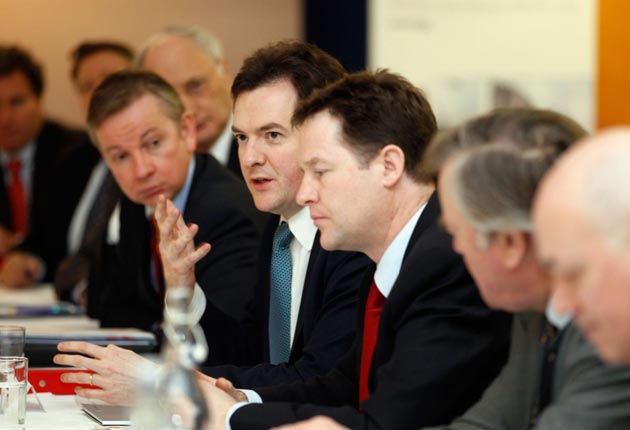Andrew Grice: Why Osborne will struggle to sell his Budget of growth
Inside Westminster

David Cameron promised to end Tony Blair's "sofa government" but it has made a temporary comeback ahead of next Wednesday's Budget. The package has been negotiated by four men sitting in the Prime Minister's small office in Downing Street, known since the Blair era as "the den".
Mr Cameron and the Chancellor, George Osborne, sit in comfy armchairs. Opposite, on the other side of a glass table, Nick Clegg and Danny Alexander, the Liberal Democrat Chief Secretary to the Treasury, share a sofa. Although the fine print is left to Mr Osborne, the broad outline is discussed by this inner Cabinet – "the quad", as it is known in Whitehall, short for quadrilateral.
Even though public borrowing is likely to be lower than expected, the four men have had little to play with. The Chancellor wants to acknowledge the pressure on people's living standards by easing the burden of the soaring cost of petrol, probably through a fuel price stabiliser. At the top of Mr Clegg's shopping list is a further rise in personal tax allowances. The tax-free limit will rise by £1,000 to £7,475 next month and the Chancellor may trail a further step next year towards the Lib Dems' key goal of a £10,000 allowance.
The need to compromise with the Liberal Democrats does not mean Mr Osborne is an impotent Chancellor. Far from it. Mr Osborne is more influential than he looks. If the Tories had won an overall majority last year, it would have been the Dave and George Show, as it was in opposition. Since the election, Mr Osborne may have been eclipsed by the Dave and Nick Show, but behind the scenes he is a pivotal player whose writ runs way beyond the Treasury. He is heavily involved in day-to-day operations in 10 Downing Street, as well as in the crisis management that is a necessary part of any government's work in an increasingly frantic 24/7 media age. He has been influential in the recent beefing up of the Downing Street machine. This has set up an early warning system so that bad policies – like flogging off England's public forests – are halted before they are announced. In theory, the stronger centre should allow the Chancellor to focus more on his day job, which is big enough after all. In practice, his influence at the heart of the Cameron machine will not diminish.
Mr Osborne's main task on Wednesday will be to ensure his package lives up to Mr Cameron's ambitious billing as "the most pro-growth Budget for a generation". There will be a long list of measures designed to enhance growth – which Mr Osborne and Vince Cable, the Business Secretary, have demanded from all Whitehall departments. They will also be designed to convince the public the Government is not as obsessed with cuts as its media coverage suggests.
The Chancellor's problem is that talking up growth does not guarantee it happens. His proposals to cut red tape for business will not transform the economy overnight – some will take years to have an impact. In the short term, the independent Office for Budgetary Responsibility is likely on Wednesday to downgrade its forecast that the economy will grow by 2.1 per cent this year. After the 0.6 per cent contraction in the final quarter of last year, there is nervousness at the Treasury about the GDP figures for the first quarter of this year, to be announced on 27 April. Ministers put on a confident front but fret that the momentous events in the Arab world, with its possible impact on oil prices, will stall global growth.
Mr Osborne's second Budget won't be easy. Tory MPs hope for a brilliant firework display but the Chancellor's wallet will run to sparklers rather than rockets. The nerves of Tory MPs would be calmed by the announcement of tax cuts, and business leaders are lobbying hard for him to set an end date for the 50p top rate of tax on earnings above £150,000 a year. But such pyrotechnics will probably have to wait. With the spending cuts only just starting to bite next month, many voters would find it odd to be talking about tax cuts, especially for the rich.
Twice as many people blame the previous Labour Government, rather than the Coalition, for the level of the spending cuts, according to Ipsos MORI. But 70 per cent support Labour's line that spending should be reduced more slowly to protect services, while only one in four people thinks the Government is right to cut quickly.
If growth stalls, then the clamour for Mr Osborne to slow the pace of the cuts will increase. He is adamant that there can be no Plan B, but he has to say that, doesn't he? "If things change, then we would be more flexible," one Cabinet minister told me. "But you can't advertise that in public; the moment we did, the markets would sense weakness."
Mr Osborne has too much invested in Plan A to admit there is an alternative. As he tries to sound an upbeat note on Wednesday, he will be keeping his fingers crossed he will not have to reach for the Treasury file marked Plan B.
Join our commenting forum
Join thought-provoking conversations, follow other Independent readers and see their replies
Comments
Bookmark popover
Removed from bookmarks